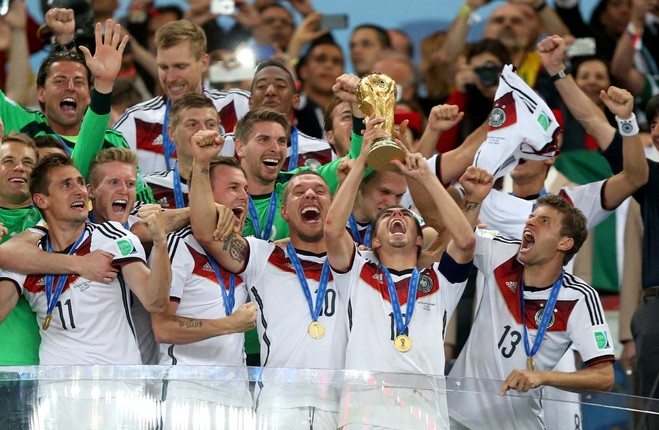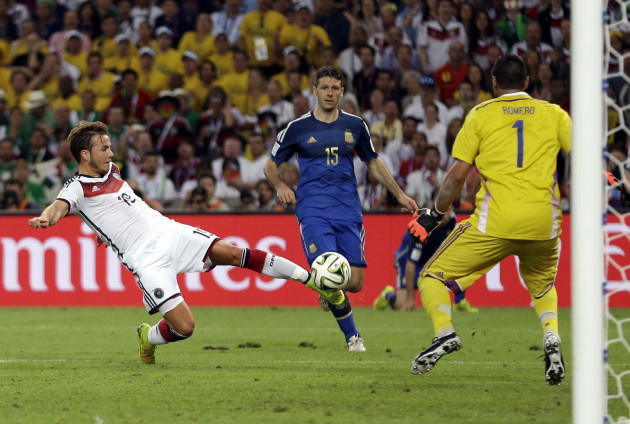AT THE BEGINNING of his 10-year tenure, Oliver Bierhoff’s main task was to mediate between the almost revolutionary fervour of then coach Jurgen Klinsmann and the dithering guardians of the German game in the clubs and the German FA. Once Joachim Low took over in 2006, however, Bierhoff assumed the role of ‘bad guy’, he says, for their frequent clashes with the ancien regime over organisational issues.
The negative coverage in South Tyrol homed in on him, too. This was shaping up to be a catastrophe of Bierhoff’s very own making, the dispatches from Italy suggested, an unholy mess of hubris, foolishness and rampant commercialism gone horribly wrong.
“Low’s driving licence, the GroBkreutz affair and the accident, none of these things stemmed from the national team. There were no conflicts within the team. Looking back at Euro 2012, I thought I should have started a fire, attacked somebody, to give the media something to write about. It was too quiet for them there.
“In South Tyrol, they had a lot to write, and the team were meanwhile able to work in peace and with focus. Lahm and Neuer joining up later was good, too, because they were able to clear their heads. Internally, we were very calm. I’d say it was like the first days of winter: outside it was suddenly very cold, but inside the heating had come on. It was nice and warm, we were happy.
“We never had the feeling that (the training camp) could endanger the whole thing. The loss of Reus robbed the team of a lot of quality, as the BVB forward had been in top form, but there were never any doubts about Lahm and Neuer recovering in time,” he adds.
Lahm was much less certain that everything was going to be all right, however. “I don’t think people really worried about me because I’m the kind of guy who always says ‘I’m okay’ when someone asks me how I am.
“But I was still in a lot of pain when I got to South Tyrol. I couldn’t move freely in the first training session, the swelling wouldn’t go down. I said to the doctors: if it stays like that, I can’t play — I will only hurt myself and the team. And Neuer’s shoulder really was touch and go.” Lahm would wear a pressure bandage “day and night for four weeks”. The team doctors had to aspirate the ankle a few times.
The captain was badly needed in a central role because neither Khedira nor Schweinsteiger looked as if they would be at their best come the start of the competition.
The sheer amount of unknown variables involved had sapped the public’s confidence in Low and co coming up with a winning formula at last. ‘That wasn’t a bad thing, though,’ says Bierhoff. “A year ago I had put out the deliberately provocative theory that winning in Brazil was all but impossible. I didn’t like the superficial way the success of Bayern and Dortmund, who had both reached the Champions League final at Wembley (in 2013), was being viewed.
“There was this sense that we were certified world-beaters again. But who had scored the goals for those two teams, how many foreign players did they have in important positions? Emotions were getting the better of people. So I pointed that out, on purpose, to argue against that sense of entitlement, and I was of course criticised for that, again. Then three months before the World Cup, the mood changed. Code red. People now thought we wouldn’t make it past the group. I didn’t mind that because it got everybody thinking about what’s really important: our work and the team’s performances.”
The coaching staff were apprehensive about another, much less discussed complication. Few outsiders knew just how bad the mood in the camp had been at the Euros, with the sizeable Bayern and Dortmund factions not seeing eye to eye and a number of younger players agitating for more playing time. In a repeat of the 2012 DFB Cup final, Germany’s two leading clubs had faced off in Berlin again in the last game of the season, four days before joining up in South Tyrol, and the match had finished in controversial fashion, with the Bavarians scoring two goals in extra-time after Mats Hummels had had what looked like a perfectly good headed goal chalked off for Dortmund.
Six frustrated BVB players met seven double winners from Bayern in Italy. Low couldn’t allow tribal rivalries and big egos to seep into the national team a second time. His concern was such that he had all but guaranteed Khedira a place in the World Cup squad, weeks before the Real Madrid midfielder could be sure to regain full fitness in time. The Stuttgart-born son of a Tunisian steel worker was somebody who could influence others with his positive attitude and bridge rifts between Bayern and Dortmund players as a neutral. Low needed him in the dressing room.
The coach and his staff were hopeful that the magnitude of the challenge in Brazil would scale down pride and pretensions. But it took until the last night in St Martin for the national team general manager to witness the squad coming closer together. Very close together, in fact.
The players’ council — Lahm, Schweinsteiger, Per Mertesacker and Klose — invited the entire DFB (German FA) delegation to ‘sweat for the trophy’ in the hotel’s ‘event sauna’, a vast space holding 80 people. Bierhoff: “The 2014 Sauna World Cup winner was there — no, I didn’t know there was such a thing, either — and he performed a show with music and strobe lights, waving towels around. We were in there with 60 men. Every player, every staff member, symbolically sweating together for this World Cup. That was an amazing idea by the players. It came from them. I don’t really believe that there’s such a thing as one ‘key moment’. But that night I remember thinking: something is happening here.”
Das Reboot: How German Soccer Reinvented Itself and Conquered the World by Raphael Honigstein is published by Penguin Random House. More info here.

